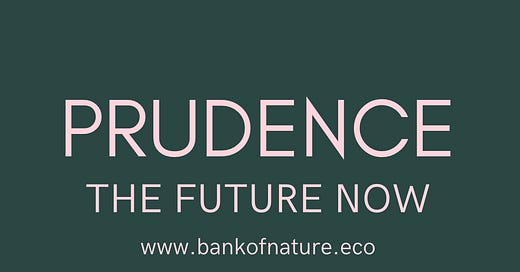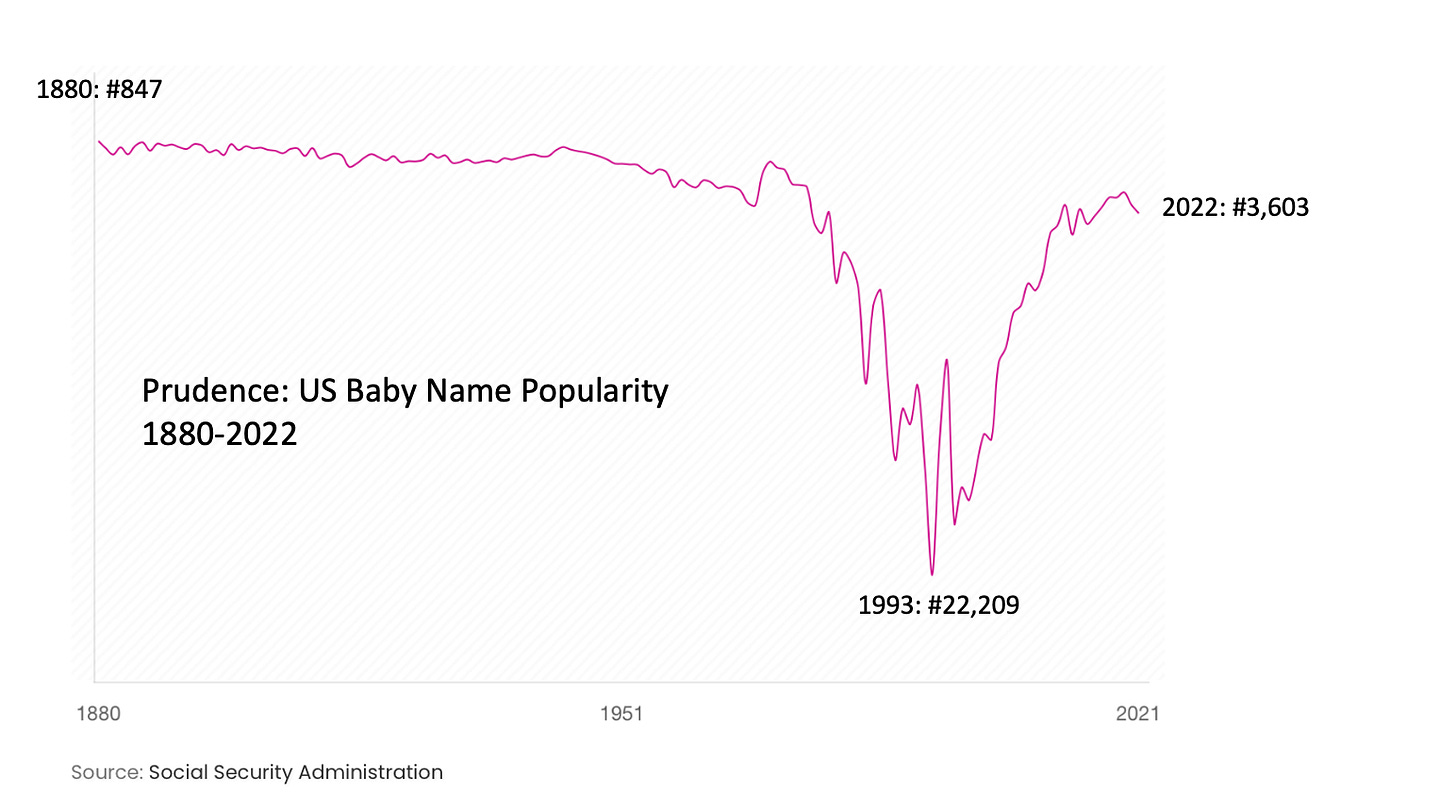If words have power, “prudence” is starting to flex under its dusty, antique petticoat.
As a (typically) gendered-female baby name, Prudence means wisdom, caution, and discretion and, as it turns out, is wisely, cautiously and discreetly moving up the annual fashionable names rosters.
Meanwhile, prudence as a legal standard of fiduciary excellence is having a more vivid moment as the US blue state/red state feud about ESG and public pensions continues into its second summer.
For instance, when was the last time prudence was discussed in the Oval Office?
Prudence Prim was the name of one of President Calvin Coolidge’s white collies circa 1926 – so there’s that.
Prudence-the-name
For humans, Prudence-the-name, was most popular in 1880, when the US Social Security Administration started to keep track. It ranked 847th among names at a time when, arguably, wisdom was more fashionable — and Prudence wasn’t competing with newer names like Kai.
[Side note: Kai is apparently the name of 2023 and means "Keeper of the keys and earth,” which seems on topic with our stewardship quest.]
Prudence is currently ranked 3,603rd among names in the US, up from its historic US low of 22,209th in 1993, which itself was a vivid drop in stylishness of 10,000 places from just two years before.
As it turns out, the 1990s were particularly rough on prudence.
The first Persian Gulf War began in 1990. In 1991, Rodney King was beaten by four Los Angeles police officers, all caught on video, who were acquitted of using “excessive force” a year later, sparking riots. Also in 1992, Diana and Charles separated under the allegations of adultery. Madonna’s divisive, erotic coffee table book Sex sold 1.5 million copies within days of its October release. Waco and Don’t Ask/Don’t Tell were 1993. There was Rwandan genocide in 1994 along with the Nancy-Tonya scandal. By 1998, when US President Bill Clinton said “I did not have sex with that woman”, Prudence was ranked 18,520th, before Columbine and Y2K hysteria in 1999.
There is some social science exploring the conflation of baby names and cultural shifts.
In the earliest days of the Puritans immigrating to America, Americans tended to pick Biblical names, like “Ichabod” and “Samuel”, according to a summary on naming trends and culture. “Later, they switched to “moral attributes” like “Faith,” “Mercy,” and “Standfast.” But in the late 18th century, the American Revolution began filling newspapers with tales of rebels fighting for independence from Britain. So, American parents began naming their children “George Washington,” “Thomas Jefferson,” “Washington Irving.” and “Martha Dandridge,” the maiden name of George Washington’s wife.
For what it’s worth, the names Rodney, Nancy, Tonya, Madonna and Bill have all fallen off in popularity in the years since they were heavily in the 1990s news.
Prudence-the-virtrue
Even if there is zero correlation between baby name trends and human-afflicted world events — it is interesting to think of it as a measure of our collective mindset. Prudence-of-any-sort is in and out of fashion.
As society changes, so should our sense of prudence – which seems like a prudent point of view.
For instance, we might argue whether philosopher Adam Smith, an early thinker about prudence and economy in “The Theory of Moral Sentiments”, would recognize his virtues today.
According to a cheat-sheet summary on his Institute’s site:
“Prudence moderates the individual’s excesses and as such is important for society. It is respectable, if not endearing. Justice limits the harm we do to others. It is essential for the continuation of social life. Beneficence improves social life by prompting us to promote the happiness of others. It cannot be demanded from anyone, but it is always appreciated. And self-command moderates our passions and reins in our destructive actions.”
Certainly, the inputs to one’s excesses today are not what Smith would have had to deal with in 1756. If prudence is a synthesis of knowledge, skills, experience, situations, priorities, values and time horizons then 270 years of history and change should render a different standard of wisdom, caution, and discretion.
Is the economic idea of scarcity the same today as it was when Smith was theorizing? Things are actually scarce, not theoretically scarce.
Do the impacts of climate, technology, population, geopolitics, consumerism, neoliberalism, the Internet, social trends, globalism… change Smith’s worldview about prudence?
If yes, how is it that we seem to work with old prudence standards and have not modernized prudence as a strategy for managing an evermore complex world?
Just as an aside, back around 300 BC, Aristotle made Prudence-the-cardinal-virtue 25% of his moral framework, along with, Justice, Temperance — both of which, by the way, are presently more popular names than Prudence — and Courage, which doesn’t seem to be anyone’s name.
“What would Prudence do?”
In 2023, I couldn’t find an online influencer named Prudence, unless you count advice columnists. Meanwhile, deliberate imprudence and manufactured scandal in our celebrity culture can make you Kardashian famous faster. Wise, cautious and discreet are not brand attributes of someone getting noticed on social media, or cast on reality television.
Prudence is too careful when, today, we prefer to speculate on risky behavior, choices and investments that boast of greater ROI amid the threats of greater loss and regardless of the costs to anything else. Prudence, I’m sure, calls that stupid.
Part of our case at Bank of Nature is that prudence is not practiced by fiduciaries in charge of tens of trillions globally when growth comes at the expense of the future.
They are, against the backdrop of law, imprudent faithless fiduciaries and are vulnerable to legal scrutiny — we say — because we aren't paying attention to investment opportunities that are safe, steady and reliable — and the hallmarks of stewardship that curates a future.
Everyone loses in this distraction from prudence because fiduciaries, who ought to do better and know better, are taking reckless chances with money that is designed to deliver a promise. It’s money that works at the scale of climate and the scale of nature and is larger than any other source of duty-bound money in the economy.
If, in the aggregate, global fiduciaries practiced their own Prudent Person Rule, the world would be safer now and in the future. They would move tens of trillions to what we call the "Untaken Safer Alternative" — aka prudence in the law.
Somehow, that's not a sexy reason to update our prudence.
By the way, Reason, as a typically male gendered baby name derived from the French, ranks below Prudence in the US rankings, at 8748th in 2022.
In what ways should Prudence modernize?
In the romcom storyline set 100 years ago, Millie experiments with being thoroughly modern by living in a big city, getting a haircut and a job, clubbing with the girls and marrying for money — ambitions and behaviors not so modern today, especially since hers were thwarted by old-fashioned true love.
Her great-great-great granddaughter Prudence might also frown at Millie's racist plot line about slavery that doesn't age well. So, what's a modern Prudence to do?
What’s a modern take on wisdom?
There is no lack of online advice on “how to be wise” today, so I’ll point to knowledge + experience + context + synthesis + compassion + understanding of human nature. Is it modern wisdom, for example, for people obligated by prudence, like fiduciaries of public pensions, to invest in the oil and gas sector for only the returns on investment? It’s illegal according to our strict reading of fiduciary duty law — so, unwise.
What makes caution the new black?
This text says caution is based in science. That’s modern, right?
The anterior cingulate cortex (ACC) —an area located near the top of the brain's frontal lobes — has long been known to help detect mistakes in action. The ACC can also predict —based on past experience — how likely the person is to goof up on a given task.
Caution today in our climate change subject area might be about shifting fiduciary money away from toxic industries, regardless of their ROI, because of the long-term impacts of those choices. Caution is not the opposite of risk. Caution is smart and legal — and now.
What is a discreet person doing today?
If discreet is being "careful and circumspect in one's speech or actions, especially in order to avoid causing offense" then Encyclopedia.com has just explained a fiduciary's Duty of Impartiality. To wit:
“An executor or trustee cannot favor one beneficiary over another. If someone is serving as a trustee and is a fiduciary in that manner, they must balance the interest between the current and future beneficiaries,” says this law office.
Young people should be offended by the indiscreet and partial ways in which fiduciaries work to appease only the retirees already collecting benefits.
As Smith’s institute says,
Prudence moderates the individual’s excesses and as such is important for society. It is respectable, if not endearing.
What moderates excesses that are important for society now?
Shame, threats, protests and anger about human-accelerated climate change, for example, seem not to sway the status quo. Lawsuits are costly, jurisdictional and time consuming and offer no certainty in moderating excesses that have direct ties to diminishing the future —even the wins. Money, I suppose. The less you have of it, the less excessive you are as a function of society. Fiduciary money is defined by moderation, but so far doesn't practice it, according to our Massachusetts Senate Bill. Fiduciary money is being misused to finance excess in the economy. That’s imprudent.
What makes prudence endearing?
I'd settle for understood. Prudence is not cute, cuddly or optional. Fiduciary duty law demands prudence and a modern take on prudence is that our use of it is way out of date.
What makes it respectable?
Respect, arguably, is another dated term that doesn't seem to mean much today. Let’s say respect is a synonym for power rather than prudence. A modern take, hint hint, is for young people in jobs that promise them a future dignified retirement decades away to demand the respect that the law affords them, but common best practice ignores.
That's a power that makes prudence modern.









